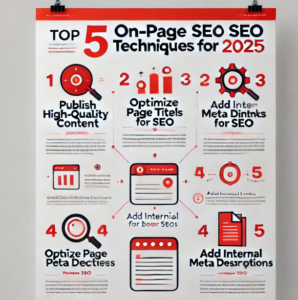Summary: This blog is a comprehensive ecommerce SEO guide that includes key strategies like keyword research and on-page optimization and best practices to increase visibility and drive sales.
Key Takeaways
- Ecommerce SEO boosts visibility, increasing traffic and driving more sales effectively.
- Make sure your customers find the right products through the right keyword research.
- Avoid duplicate content by writing unique product descriptions.
- Structured data improves search engine understanding, leading to richer results.
Do you have trouble attracting clients to your online shop? SEO for ecommerce can help! It raises your store’s visibility in search results, which means more potential customers will see it.
You can attract more customers and significantly boost your store’s visibility by utilizing smart ecommerce SEO strategies. The effect is the same as if a neon sign were flashing “Shop Here!” to all internet users.
What is ECommerce SEO?
Increasing a website’s visibility in search engine results is the goal of search engine optimization or SEO. Plus, any business can enjoy an increase in free visitors, and this is no exception. But for online stores, there’s a special kind of SEO called ecommerce SEO.
So, is it completely distinct? Not quite. While both SEO and organic traffic generation have a common goal, ecommerce SEO works specifically to increase sales by driving visitors to your product pages.
Importance of SEO in Ecommerce
Here’s why it matters: It’s a cost-effective way to reach more people and increase visibility. Did you know? Product-related research keywords are used 30% more recently than they were before. This implies more people than ever are taking the time to look for what they want online. If you have an optimized ecommerce site, you have a better chance of ranking higher in the search results. Thus, it doesn’t matter what you are selling.
Moreover, it is important because potential customers only want to look at the first page of search engine results and don’t want to scroll through a lot of options. In fact, 53.3% of all site traffic comes from organic search results. This shows how important SEO is for getting more than half of all site visits.
ECommerce SEO Strategies and Best Practices
ECommerce SEO practices improve ecommerce keyword strategy visibility and ranking on search engine results pages.
Let’s discuss the best SEO strategies for ecommerce sites.
1. Keyword Research
In order to attract customers, you must be familiar with every search term they might use to find your store. Search engine optimization strategies for online stores are based on your keyword list. Due to this, you’ll be thinking about new ecommerce keyword strategies all the time.
Also, it’s never-ending, especially when you’re adding new pages and products to your store. Given the dynamic nature of Google’s search trends, all newly created pages must conduct fresh research.
SEO experts use tools to find the best keywords for your online store. But they don’t just pick any keywords – they target keywords that show real buying intent. This means finding keywords that people use when they’re ready to purchase, not just browsing. Similarly, by focusing on these high-value keywords, ecommerce SEO services can help your store attract more qualified leads.
2. ECommerce SEO and Search Intent
Ever wonder what people are really looking for online? This is what is known as “search intent.” For instance, are they trying to find a specific product page, browse a category, or learn more about something before buying?
This is why figuring out that intent and using the right keywords is crucial. Don’t just target any random phrase. Instead, focus on keywords that show people are ready to buy, not just curious.
SEO masters this art. They use an effective ecommerce seo strategy to understand search intent, find keywords with buying power, and ultimately boost your website’s ranking.
3. On-Page Optimization for eCommerce SEO
Content, headers, title tags, and meta descriptions are written, formatted, and organized during optimization. This process increases the page’s ranking for keywords.
Some people decide to make a long list of 10 to several hundred keywords for their website. However, depending on the SEO work, this strategy might work.
Furthermore, to make a website work better, you need to find a focus keyword, secondary keywords, and LSI terms that qualify it. Smartly using these can help your search engine rankings. URLs, titles, and meta descriptions affect click-through rates in search results. Thus, they need to be interesting.
For example, suppose the page in question is a Nike product page. In that scenario, the primary keyword could be “Nike running shoes for sale,” while the secondary keyword could be “Nike Air Zoom Pegasus.” The LSI may also include terms such as “breathable mesh,” “cushioning support,” and “lightweight trainers,” among others.
4. Engaging Product Descriptions
Writing unique product descriptions that build your brand and engage your audience is one of the perfect ways to use ecommerce SEO.
Additionally, people and search engines will notice your ecommerce implementation services more if you do this.
Online stores often copy and paste product descriptions from manufacturers, which leads to a lot of sites with duplicate content. To add, it’s even more important to have a good product page copy if your items are on many eCommerce sites. Also, making sure products have unique, interesting descriptions can help your organic rankings.
5. Focus on Store Navigation
Even though user experience is essential, modern eCommerce stores don’t put enough value on it. Accordingly, websites should be simple to navigate and use, especially on phones. It is key to make it easier to go from the home page to the checkout page.
As a result, this plan improves organic visibility and sales. Google tracks search engine returns and site visits, so making the site easy to use and navigate is very important.
6. Structured Data for eCommerce Websites
This is the most imperative SEO strategy for ecommerce websites. It gives search engines a lot of information about a product page.
Structured data lets businesses share product information with search engines. The information includes names, prices, availability, and reviews. Consequently, this makes the content more accessible and easy to understand.
Not only that, it makes eCommerce listings more visible and makes it easier for rich results. For example, product snippets and star ratings to show up on SERPs.
Ultimately, this strategic move makes the search more exciting and valuable. So, it increases the chances of clicks and stands out in the crowded digital market.
7. Link Building and Off Page Optimization
The two important strategies of ecommerce SEO are Link building and off-page optimization.
Link building is the process of getting other trustworthy websites to link to yours. Google sees these links as signs of trust. Additionally, off-page optimization improves the user experience and your search engine rankings.
Good off-page SEO strategies include building backlinks, promoting on social media, monitoring reviews, and keeping up with local listings. Accordingly, all these strategies together can help your website’s SERP ranking and reputation.
8. Highlight Customer Reviews and Engagement
Asking customers for detailed reviews can help you in two ways. First, more people will see your site because good reviews will make people trust you and bring new customers. Second, review posts are a great way to keep your content fresh for search engines.
That’s not all! Answering both good and bad reviews shows that you care about your customers. This helps people know and trust your business, which is great for SEO. It’s good for everyone: customers are happy, search engines are happy, and your online store does well.
Conclusion
These are the ecommerce SEO best practices that can help your online store gain a potential audience, achieve higher visibility, and more.
As one of the top SEO agencies, we know how to implement the strategies and best practices above. Thus, if you are considering an SEO audit or long-term SEO strategy for your eCommerce website, contact us for our ecommerce SEO services.
Frequently Asked Questions (FAQs)
Q1. What is the best SEO for ecommerce?
A1. Using long-tail keyword variations of your target keywords for products and categories is a great way to optimize your blog posts for eCommerce SEO. Moreover, articles on how to do things, reviews of products, etc., should be part of this.
Q2. How does SEO work for ecommerce?
A2. Ecommerce search engine optimization means making small changes to your website to improve its performance with search engines and changing the content to match what your customers are looking for. SEO can help store owners attract more visitors, raise awareness of their brand, and increase sales.
Q3. What are the best ecommerce SEO tools?
A3. Best ecommerce SEO tools that is help in upgrading online Stores:
- SEMrush
- Ahrefs
- Moz Pro
- Yoast SEO
- Google Keyword Planner
Q4. How can SEO grow ecommerce site traffic?
A4. SEO brings more people to your site by using valuable keywords related to your products and matching what people are looking for. By strategically placing these keywords in your product descriptions, meta tags, and content, SEO experts help your site reach higher search results and attract the right kind of visitors.

Sarabjeet Singh is the Vice President of Operations at Tech2Globe and brings over 15 years of experience in various industries, including IoT, education, retail, government, FMCG, hospitality, and e-commerce. His leadership focuses on operational excellence and exceeding customer expectations, implementing contemporary solutions. Sarabjeet’s expertise spans e-commerce consulting, software development, data management, BPO/KPO support services, digital marketing, graphics, and startup consulting. He fosters a collaborative work environment, ensuring Tech2Globe delivers high-quality solutions.










